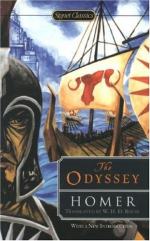Now when the fair lady had come even to the treasure-chamber, and had stept upon the threshold of oak, which the carpenter had on a time planed cunningly, and over it had made straight the line,—doorposts also had he fitted thereby, whereon he set shining doors,—anon she quickly loosed the strap from the handle of the door, and thrust in the key, and with a straight aim shot back the bolts. And even as a bull roars that is grazing in a meadow, so mightily roared the fair doors smitten by the key; and speedily they flew open before her. Then she stept on to the high floor, where the coffers stood, wherein the fragrant raiment was stored. Thence she stretched forth her hand, and took the bow from off the pin, all in the bright case which sheathed it around. And there she sat down, and set the case upon her knees, and cried aloud and wept, and took out the bow of her lord. Now when she had her fill of tearful lament, she set forth to go to the hall to the company of the proud wooers, with the back-bent bow in her hands, and the quiver for the arrows, and many shafts were therein winged for death. And her maidens along with her bare a chest, wherein lay much store of iron and bronze, the gear of combat of their lord. Now when the fair lady had come unto the wooers, she stood by the pillar of the well-builded roof, holding up her glistening tire before her face; and a faithful maiden stood on either side of her, and straightway she spake out among the wooers and declared her word, saying:
’Hear me, ye lordly wooers, who have vexed this house, that ye might eat and drink here evermore, forasmuch as the master is long gone, nor could ye find any other mark {*} for your speech, but all your desire was to wed me and take me to wife. Nay come now, ye wooers, seeing that this is the prize that is put before you. I will set forth for you the great bow of divine Odysseus, and whoso shall most easily string the bow in his hands, and shoot through all twelve axes, with him will I go and forsake this house, this house of my wedlock, so fair and filled with all livelihood, which methinks I shall yet remember, aye, in a dream.’
{* The accepted interpretation of [Greek] (a word which occurs only here) is ‘pretext’; but this does not agree with any of the meanings of the verb from which the noun is derived. The usage of [Greek] in Od. xix. 71, xxii. 75, of [Greek] in Il. xvii. 465, and of [Greek] in Od. xxii. 15, suggests rather for [Greek] the idea of ’aiming at a mark.’}




